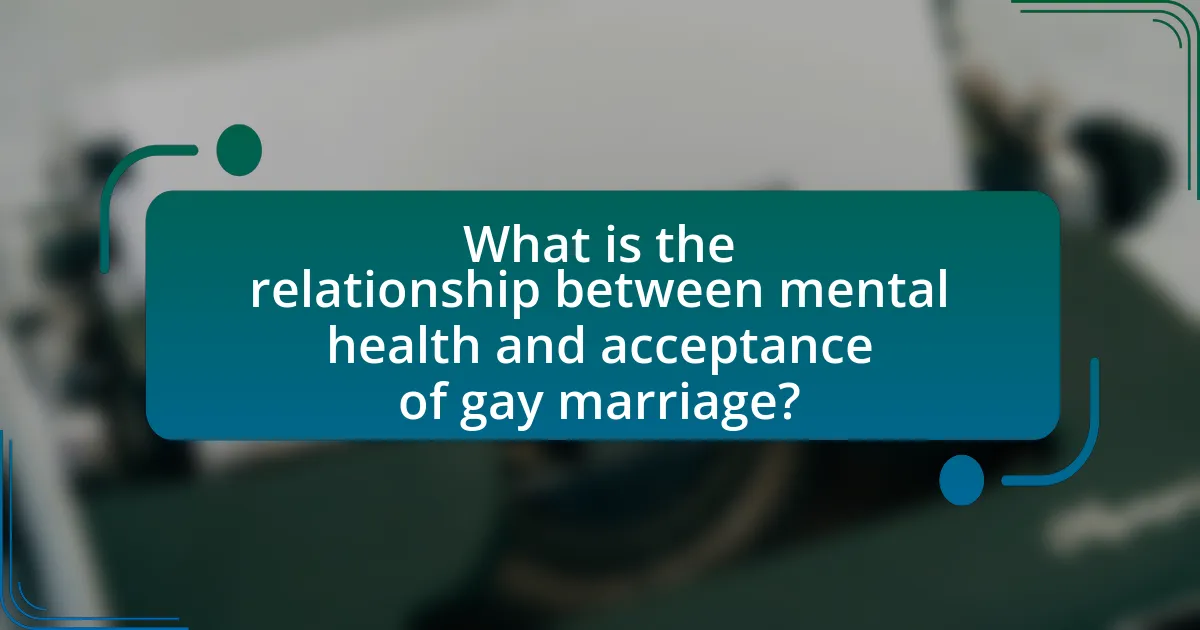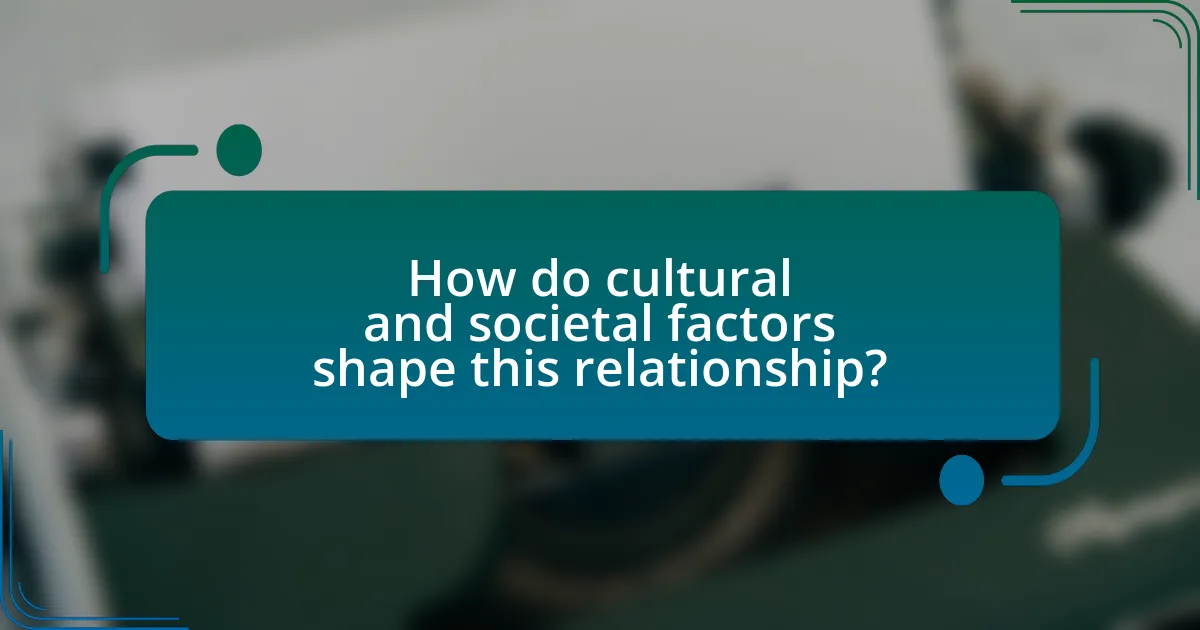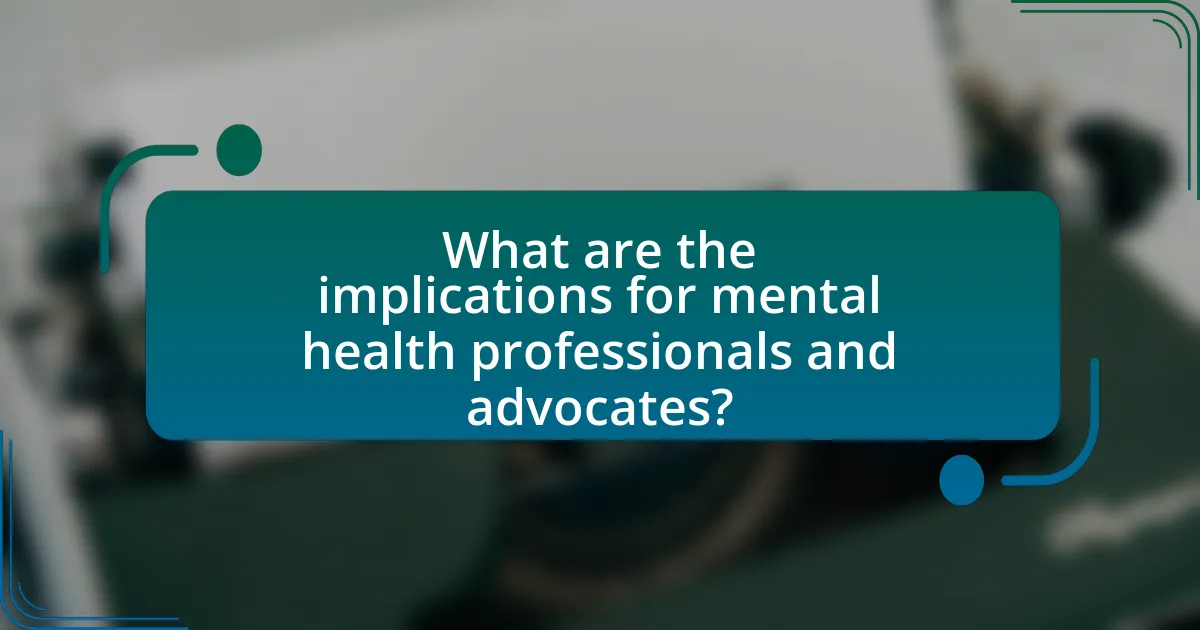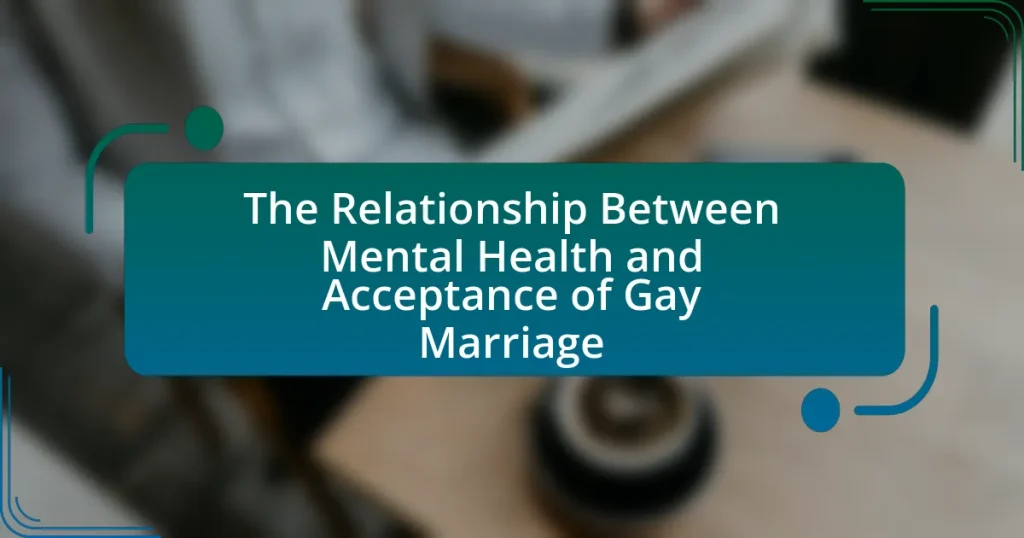The article examines the significant relationship between mental health and the acceptance of gay marriage, highlighting how societal acceptance correlates with improved mental health outcomes for LGBTQ+ individuals. It discusses how higher acceptance reduces stigma and discrimination, leading to lower rates of mental health issues such as depression and anxiety. The article also explores how mental health influences attitudes towards gay marriage, the psychological factors that contribute to acceptance, and the impact of cultural and societal norms. Additionally, it addresses the role of legal changes and advocacy in shaping mental health initiatives, emphasizing the importance of supportive environments for enhancing the well-being of LGBTQ+ individuals.

What is the relationship between mental health and acceptance of gay marriage?
The relationship between mental health and acceptance of gay marriage is significant, as higher acceptance correlates with improved mental health outcomes for LGBTQ+ individuals. Studies indicate that societal acceptance reduces stigma and discrimination, which are major contributors to mental health issues such as depression and anxiety among LGBTQ+ populations. For instance, research published in the American Journal of Public Health found that states with legalized same-sex marriage reported lower rates of suicide attempts among LGBTQ+ youth, highlighting the positive impact of acceptance on mental well-being.
How does mental health influence attitudes towards gay marriage?
Mental health significantly influences attitudes towards gay marriage, as individuals with better mental health tend to exhibit more acceptance and support for LGBTQ+ rights. Research indicates that mental health conditions, such as anxiety and depression, can lead to negative attitudes due to increased stress and social isolation, which may foster prejudice. Conversely, individuals with positive mental health are often more open-minded and empathetic, contributing to a greater acceptance of diverse sexual orientations. A study published in the Journal of Homosexuality found that higher levels of psychological well-being correlate with more favorable attitudes towards gay marriage, highlighting the importance of mental health in shaping social perspectives.
What psychological factors contribute to acceptance of gay marriage?
Psychological factors contributing to the acceptance of gay marriage include empathy, exposure to diverse sexual orientations, and cognitive dissonance reduction. Empathy allows individuals to understand and share the feelings of LGBTQ+ individuals, fostering acceptance. Research indicates that increased contact with LGBTQ+ individuals leads to greater acceptance, as seen in studies showing that people with LGBTQ+ friends are more likely to support gay marriage. Cognitive dissonance reduction occurs when individuals reconcile their beliefs with changing societal norms, leading to a shift in attitudes toward acceptance. These factors collectively influence societal attitudes and contribute to the growing acceptance of gay marriage.
How do societal norms affect mental health in relation to gay marriage acceptance?
Societal norms significantly impact mental health concerning gay marriage acceptance by influencing individuals’ self-identity and societal belonging. When societal norms are supportive of gay marriage, individuals in the LGBTQ+ community often experience lower levels of anxiety, depression, and stigma, leading to improved mental health outcomes. Conversely, in societies where gay marriage is stigmatized or rejected, individuals may face discrimination, social isolation, and internalized homophobia, which can exacerbate mental health issues. Research indicates that acceptance of gay marriage correlates with reduced mental health disparities among LGBTQ+ individuals, as seen in studies showing that states in the U.S. that legalized gay marriage reported lower rates of suicide attempts among LGBTQ+ youth.
What role does acceptance of gay marriage play in mental health?
Acceptance of gay marriage significantly enhances mental health by reducing stigma and promoting social support for LGBTQ+ individuals. Studies indicate that higher levels of societal acceptance correlate with lower rates of depression and anxiety among gay individuals. For instance, research published in the American Journal of Public Health found that states with legalized same-sex marriage reported a 7% decrease in suicide rates among LGBTQ+ youth, highlighting the positive impact of acceptance on mental well-being. Furthermore, acceptance fosters a sense of belonging and validation, which are crucial for psychological resilience.
How does acceptance impact the mental well-being of LGBTQ+ individuals?
Acceptance significantly enhances the mental well-being of LGBTQ+ individuals by reducing feelings of isolation and increasing self-esteem. Research indicates that LGBTQ+ individuals who experience acceptance from family, friends, and society report lower levels of depression and anxiety. A study published in the American Journal of Public Health found that LGBTQ+ youth who felt accepted by their families had a 40% lower risk of attempting suicide compared to those who did not feel accepted. This correlation underscores the critical role that acceptance plays in fostering a supportive environment, which is essential for the mental health of LGBTQ+ individuals.
What are the mental health outcomes for individuals in accepting environments?
Individuals in accepting environments experience significantly improved mental health outcomes, including lower levels of anxiety, depression, and stress. Research indicates that acceptance fosters a sense of belonging and reduces stigma, which are critical factors in enhancing psychological well-being. For instance, a study published in the Journal of Counseling Psychology found that LGBTQ+ individuals in supportive communities reported higher self-esteem and lower rates of suicidal ideation compared to those in non-accepting environments. This evidence underscores the positive correlation between acceptance and mental health, highlighting the importance of supportive social contexts in promoting mental wellness.

How do cultural and societal factors shape this relationship?
Cultural and societal factors significantly shape the relationship between mental health and acceptance of gay marriage by influencing attitudes, beliefs, and support systems. Societies that embrace diversity and promote inclusivity tend to foster better mental health outcomes for LGBTQ+ individuals, as acceptance reduces stigma and discrimination. For instance, research published in the American Journal of Public Health indicates that higher levels of societal acceptance correlate with lower rates of mental health issues among LGBTQ+ populations. Conversely, cultures that maintain traditional views on marriage may contribute to increased mental health challenges for individuals who identify as gay, as they face social rejection and isolation. This dynamic illustrates how cultural norms and societal attitudes directly impact the mental well-being of those affected by the acceptance of gay marriage.
What cultural attitudes influence mental health and gay marriage acceptance?
Cultural attitudes significantly influence both mental health and the acceptance of gay marriage. Societies that promote inclusivity and diversity tend to have lower rates of mental health issues among LGBTQ+ individuals, as acceptance reduces stigma and discrimination. For instance, research published in the “American Journal of Public Health” by Hatzenbuehler et al. (2014) found that states with more supportive policies for gay marriage reported lower rates of suicide attempts among LGBTQ+ youth. Conversely, cultures that uphold traditional views on marriage and sexuality often perpetuate negative stereotypes and discrimination, leading to increased mental health challenges for those who identify as LGBTQ+. This correlation highlights the importance of cultural attitudes in shaping both societal acceptance of gay marriage and the mental well-being of LGBTQ+ individuals.
How do different cultures perceive gay marriage and its impact on mental health?
Different cultures perceive gay marriage in varied ways, significantly influencing mental health outcomes for LGBTQ+ individuals. In cultures that embrace gay marriage, such as many Western nations, acceptance leads to improved mental health, evidenced by lower rates of depression and anxiety among LGBTQ+ individuals. Conversely, in cultures that reject or criminalize gay marriage, such as in parts of Africa and the Middle East, individuals often experience heightened stigma, discrimination, and mental health challenges, including increased rates of suicide and substance abuse. Research published in the American Journal of Public Health indicates that legal recognition of same-sex marriage correlates with a 7% reduction in suicide rates among LGBTQ+ youth in the United States, highlighting the positive mental health impact of societal acceptance.
What is the role of religion in shaping attitudes towards gay marriage?
Religion plays a significant role in shaping attitudes towards gay marriage, often influencing beliefs and values regarding sexuality and marriage. Many religious traditions, particularly conservative branches of Christianity, Islam, and Judaism, typically view gay marriage as incompatible with their teachings, leading to negative attitudes among adherents. For instance, a 2019 Pew Research Center study found that 70% of white evangelical Protestants in the U.S. oppose same-sex marriage, reflecting the strong influence of religious doctrine on personal beliefs. Conversely, more liberal religious groups, such as certain denominations of Unitarian Universalism and the Episcopal Church, support gay marriage, indicating that religious interpretation can vary widely. This divergence in beliefs illustrates how religion can both hinder and promote acceptance of gay marriage, ultimately affecting mental health outcomes for LGBTQ+ individuals based on the level of acceptance within their religious communities.
How do legal changes affect mental health and acceptance of gay marriage?
Legal changes, such as the legalization of gay marriage, significantly improve mental health outcomes and increase societal acceptance of LGBTQ+ individuals. Research indicates that states in the U.S. that legalized same-sex marriage experienced a notable decrease in suicide rates among LGBTQ+ youth, with a study published in the American Journal of Public Health reporting a 7% reduction in suicide attempts among this demographic following legalization. Furthermore, legal recognition fosters a sense of belonging and validation, which enhances overall mental well-being. Acceptance of gay marriage also correlates with increased public support for LGBTQ+ rights, as evidenced by surveys showing that public opinion shifts positively in regions where legal changes occur, leading to a more inclusive society.
What are the psychological effects of legalizing gay marriage on society?
Legalizing gay marriage positively impacts societal psychological well-being by fostering acceptance and reducing stigma against LGBTQ+ individuals. Research indicates that such legalization correlates with lower rates of mental health issues, including depression and anxiety, among LGBTQ+ populations. A study published in the American Journal of Public Health found that states legalizing same-sex marriage experienced a 7% decrease in suicide rates among LGBTQ+ youth, highlighting the mental health benefits associated with societal acceptance. Additionally, the overall societal shift towards inclusivity enhances community cohesion and promotes a culture of respect, further contributing to improved mental health outcomes across diverse populations.
How does the repeal of gay marriage laws impact mental health outcomes?
The repeal of gay marriage laws negatively impacts mental health outcomes for LGBTQ+ individuals. Research indicates that such legal changes can lead to increased feelings of stigma, discrimination, and social exclusion, which are associated with higher rates of anxiety, depression, and suicidal ideation among this population. A study published in the American Journal of Public Health found that states that legalized same-sex marriage saw a significant decrease in suicide rates among LGBTQ+ youth, highlighting the protective effect of legal recognition on mental health. Conversely, the repeal of these laws can reverse these gains, exacerbating mental health challenges.

What are the implications for mental health professionals and advocates?
The implications for mental health professionals and advocates include the necessity to address the mental health needs of LGBTQ+ individuals, particularly in the context of societal acceptance of gay marriage. Research indicates that increased acceptance of gay marriage correlates with improved mental health outcomes for LGBTQ+ populations, as evidenced by a study published in the American Journal of Public Health, which found that states legalizing same-sex marriage reported lower rates of suicide and mental health issues among LGBTQ+ individuals. Mental health professionals must therefore advocate for policies promoting acceptance and inclusivity, as these factors significantly influence the psychological well-being of their clients. Additionally, advocates should focus on educating communities about the mental health benefits associated with acceptance, thereby fostering environments that support LGBTQ+ individuals.
How can mental health professionals support individuals affected by these issues?
Mental health professionals can support individuals affected by issues related to the acceptance of gay marriage by providing a safe and affirming environment for open dialogue. This support includes offering counseling services that address the emotional and psychological impacts of societal stigma, discrimination, and internalized homophobia. Research indicates that individuals who experience acceptance and support from mental health professionals report lower levels of anxiety and depression (Meyer, 2003, American Psychological Association). Additionally, mental health professionals can facilitate support groups that foster community and connection among individuals facing similar challenges, thereby enhancing resilience and coping strategies.
What strategies can be employed to promote acceptance and improve mental health?
To promote acceptance and improve mental health, strategies such as education, community engagement, and supportive policies can be employed. Education initiatives that provide accurate information about LGBTQ+ identities and issues can reduce stigma and foster understanding, as evidenced by studies showing that informed communities exhibit higher levels of acceptance. Community engagement through events and support groups can create safe spaces for dialogue and connection, which has been linked to improved mental well-being among LGBTQ+ individuals. Additionally, supportive policies, such as anti-discrimination laws and mental health resources tailored for LGBTQ+ populations, have been shown to enhance mental health outcomes by providing necessary protections and access to care.
How can advocacy for gay marriage influence mental health initiatives?
Advocacy for gay marriage can significantly influence mental health initiatives by promoting acceptance and reducing stigma associated with LGBTQ+ identities. This acceptance leads to improved mental health outcomes, as studies indicate that legal recognition of same-sex marriage correlates with lower rates of depression and anxiety among LGBTQ+ individuals. For instance, research published in the American Journal of Public Health found that states legalizing same-sex marriage experienced a 7% decrease in suicide rates among LGBTQ+ youth. By advocating for gay marriage, mental health initiatives can focus on creating supportive environments that foster well-being and resilience within the LGBTQ+ community.
What best practices can be adopted to foster acceptance and mental well-being?
To foster acceptance and mental well-being, individuals and communities can adopt practices such as promoting open dialogue, providing education on LGBTQ+ issues, and creating supportive environments. Open dialogue encourages understanding and reduces stigma, as evidenced by studies showing that communication can significantly improve attitudes towards marginalized groups. Education on LGBTQ+ issues, including the history and challenges faced by the community, has been shown to increase empathy and acceptance, as highlighted in research by Herek (2009) in the Journal of Homosexuality. Creating supportive environments, such as inclusive workplaces and safe spaces, contributes to improved mental health outcomes, with data indicating that acceptance leads to lower rates of anxiety and depression among LGBTQ+ individuals.
What community programs are effective in promoting acceptance of gay marriage?
Community programs that effectively promote acceptance of gay marriage include educational workshops, advocacy campaigns, and support groups. Educational workshops, such as those conducted by organizations like PFLAG, provide information about LGBTQ+ issues, fostering understanding and empathy among participants. Advocacy campaigns, like the Human Rights Campaign’s initiatives, raise awareness and encourage dialogue within communities, leading to increased acceptance. Support groups, such as those offered by local LGBTQ+ centers, create safe spaces for individuals to share experiences and build solidarity, which can positively influence community attitudes toward gay marriage. These programs have been shown to reduce prejudice and enhance mental well-being by promoting inclusivity and understanding.
How can education play a role in improving mental health and acceptance?
Education can significantly improve mental health and acceptance by providing accurate information about LGBTQ+ identities and fostering empathy. Comprehensive educational programs that include discussions on sexual orientation and gender identity can reduce stigma and discrimination, which are major contributors to mental health issues among LGBTQ+ individuals. Research indicates that inclusive curricula lead to higher levels of acceptance and lower rates of bullying, which positively impacts the mental well-being of both LGBTQ+ youth and their peers. For instance, a study published in the Journal of School Health found that schools with LGBTQ+-inclusive policies reported lower rates of depression and anxiety among students. Thus, education serves as a crucial tool in promoting understanding and acceptance, ultimately enhancing mental health outcomes.


